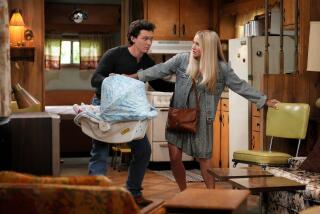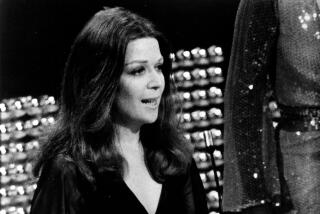Embracing the Darker Side of Comedy
Diane English, the veteran television producer, says Murphy Brown’s breast cancer is not a ratings gimmick, even though ratings have bumped up slightly. This show is 10 years old, and they’re beyond that sort of thing. Besides, this is the last season, anyway: Who needs gimmicks when the show’s days are so clearly numbered?
And no, no, no: This is not about getting laughs at the expense of one of the worst diseases a human being can possibly have. This is about a once-fine TV show, starring Candice Bergen, that had grown tired, boring, irrelevant and unwatched. “Murphy Brown,” and Murphy Brown, deserve to go out with a bang, English says of the show she created and has now returned to after five years. They deserve--and, frankly, have earned--a right to tackle breast cancer.
“Murphy Brown,” in fact, joins a solid, if not particularly ancient, tradition of sitcoms whose characters suddenly get slugged with life’s hard knocks. Call it “When Bad Things Happen to Good Sitcom Characters.”
What, pray tell, is so funny about this?
Nothing, of course, but that’s not why English and a handful of other sitcom producers over the years have put their beloved characters in peril.
Most observers agree that the tradition began in the early 1970s with the landmark “All in the Family” and since then has touched a number of other sitcoms. Norman Lear’s “All in the Family,” which introduced racial and political themes to sitcoms, often refused to sugarcoat its characters. To name just a few: Mike Stivic (Rob Reiner) was temporarily impotent; his wife, Gloria (Sally Struthers), miscarried; her mother, Edith (Jean Stapleton), went through menopause, discovered a lump in her breast and, in a memorable 1977 one-hour episode, was nearly raped by a living-room intruder.
A sample of dialogue illustrates just how well the show balanced the line between comedy and tragedy. As the rapist (played by David Dukes) tugs at her zipper, a desperate Edith asks, “Wouldn’t you like some coffee?” “I don’t drink coffee,” replies the intruder. “I’ve got Sanka,” Edith responds.
When Stapleton decided to leave “All in the Family,” the show’s producers decided to kill off Edith. At the opening of the 1980-81 season, it was explained off-screen that Edith had died of a stroke.
The death of another memorable character, Col. Henry Blake on “MASH,” was handled skillfully in a classic episode that ended the 1974-75 season. Blake (McLean Stevenson, who had decided to leave the series) had been given orders to ship out, and he and his men had an emotional farewell.
In the last minutes of the episode, Radar O’Reilly (Gary Burghoff) entered the operating room and told the doctors that Blake’s plane had been shot down and the colonel was dead. The camera panned slowly, capturing the crying medics. But what was truly amazing was that the actors didn’t know Blake was going to be killed until just a few minutes before the scene was shot.
In other famous instances of sitcom’s flirting with serious problems, Mary Richards in “The Mary Tyler Moore Show” had an addiction to tranquilizers, and Ted Baxter (Ted Knight) had a heart attack. In more recent years, “Roseanne’s” Dan Conner (John Goodman) suffered a fatal heart attack.
In sitcom history, however, these are the exceptions. Mike Brady never battled prostate cancer. Neither Laverne nor Shirley ever had any significant health problems to speak of. And there were almost always happy days on “Happy Days.”
So why take what is admittedly a risky leap into reality? Producers and stars have often cited similar reasons. Foremost, they have wanted to shake their audiences, however gently, out of a sitcom-induced stupor and to break ranks with an established form of entertainment in which jokes and laughs are typically generated with a factory-like precision.
The Lear shows and those from MTM, the hugely successful production company formed by Grant Tinker and Mary Tyler Moore, were born in the era of the Safe Sitcom. In those simpler days, network executives would attend show tapings to count the number of jokes and laughs per show. A high count meant the show was good. A low count meant the show was bad.
The essential insight that Lear and MTM brought to the sitcom was that great laughs could come from great tension. Their belief was that tragedy--with certain limitations--was inherently funny. The equation also could be a prescription for disaster if handled clumsily. Yet, the risk was worth it and, for a quality show, perhaps even inevitable.
Allan Burns, a co-executive producer of “The Mary Tyler Moore Show,” along with James L. Brooks, says, “You have a gut feeling about whether something is appropriate or inappropriate, and people have different feelings about that. There is such a fine line between comedy and tragedy, and I think it’s entirely appropriate when it crosses over, not only appropriate, but natural.”
Gary David Goldberg, another protege of Tinker’s, went on to create “Family Ties,” one of the dominant sitcoms of the ‘80s, which had a 1987 episode in which Alex Keaton (Michael J. Fox) coped with the death of a close friend in an auto accident.
“The basic contract with the audience is to provide comedy each week, so I don’t think a half-hour show ever has the license to step completely out of character and do a completely dramatic episode,” Goldberg says. “[But] when you raise the stakes, you get into a high-risk, high-gain area. You can get laughs just out of the tension of it, the release of it. So I always thought that when the stakes were high was when you could get the biggest laugh--if you find the proper path.”
Finding that path--through the use of a breast cancer arc--has been the daily preoccupation of “Murphy Brown’s” production staff for more than a year. English admits to motivations beyond the salvation of a tired TV show. She wants “to send the message that there is hope and that [cancer] is not a death sentence, although it certainly is if it’s caught late.”
She adds, “We in the television business are pretty tired of being bashed by politicians who grandstand and look for ways to bolster their own ratings by taking shots at [us]. Television really does more good than harm, and I hope to set an example of that.”
More to Read
The complete guide to home viewing
Get Screen Gab for everything about the TV shows and streaming movies everyone’s talking about.
You may occasionally receive promotional content from the Los Angeles Times.






